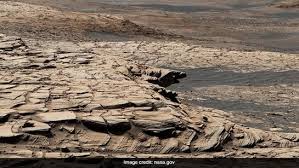Mars’ Ancient Oceans
Science & Technology TechnologyPosted by NewAdmin on 2025-02-25 09:09:35 |
Share: Facebook | Twitter | Whatsapp | Linkedin Visits: 101

Mars, once thought to be an arid and lifeless planet, may have had vast oceans in its ancient past. Recent findings from the Chinese rover Zhurong suggest that a large body of water existed in the Utopia Planitia region, one of Mars' largest impact basins. Geological observations indicate sedimentary structures and erosion patterns that resemble those found in Earth's coastal regions, suggesting that liquid water was once present on the Martian surface.
The idea of ancient oceans on Mars aligns with previous research, including data from NASA’s Curiosity and Perseverance rovers, which found evidence of ancient river channels and lake beds. These discoveries support the hypothesis that Mars once had a more hospitable environment, with conditions potentially suitable for microbial life. The presence of water also raises questions about Mars' climate history—scientists believe that billions of years ago, the planet had a thicker atmosphere that allowed liquid water to exist before it eventually thinned, causing the oceans to evaporate or freeze.
Further analysis of sediment samples and mineral composition is needed to confirm the existence of these ancient Martian oceans. Understanding Mars' watery past could provide crucial insights into whether life once existed beyond Earth and how planets evolve over time. These findings reinforce the idea that Mars was once a dynamic and potentially habitable world before it transformed into the dry and dusty planet we see today.
Search
Categories
Recent News
- Hyderabad Firm's $700K Foreign Exchange Fraud Unveiled
- Indian-Israeli Alliance: Unlocking AI's Edge Potential
- T20 World Cup 2026: Pakistan Refuses to Face India in High-Stakes Match
- Massive Development Push in Nellore Rural: 240 Projects, One Goal
- Unveiling the Truth: Maxwell Emails Validate Prince Andrew's Scandalous Photo
- Royal Courage: Kate Middleton's Cancer Battle and Message of Hope
- Solar Power Shines on Temple Lands
- Suryakumar's Resurgence: A Masterclass in Adaptability
Popular News
- Navigating IPO Market Dynamics Amid Volatility and Regulatory Changes
- Massive Worldwide Microsoft Outage Disrupts Multiple Sectors
- Panjapur Bus Stand to Reshape TNSTC Routes
- తెలుగుదేశం పార్టీ - పేదరికాన్ని నిర్మూలించడంలో వాగ్దానం
- Universities Embrace Remote Learning Technologies Amidst Ongoing Pandemic